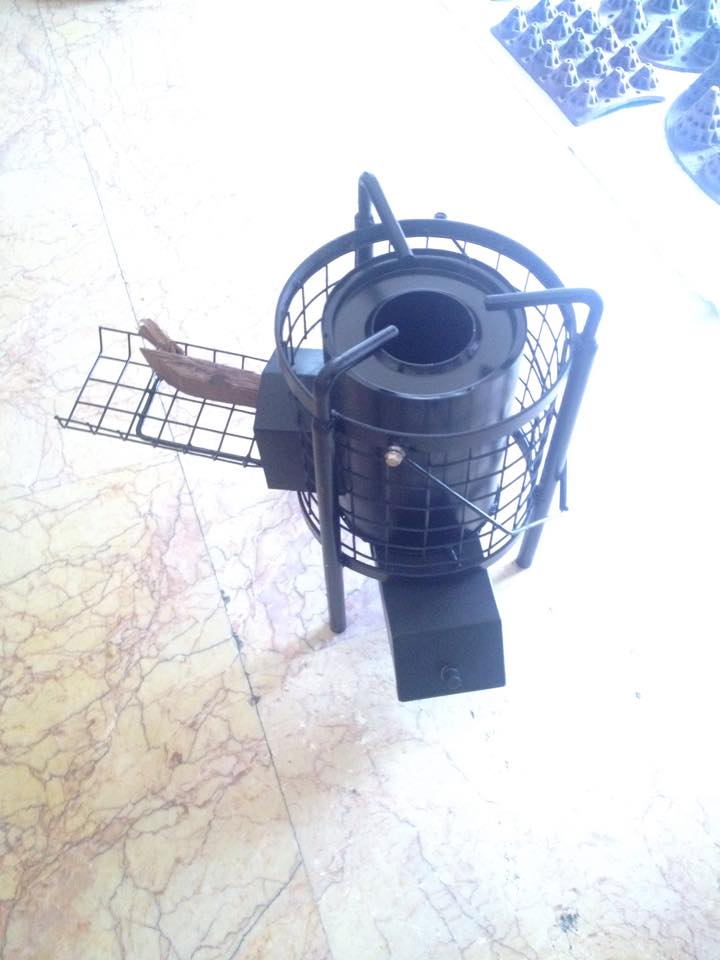DATABASE
Mitigation of climate change through installation of Newly Modified Matribhumi Improved Cooking Stove (M-ICS)
completed
Link
www.newinitiative.org.np
Abstract
The project had successfully installed 1016 M-ICS providing benefits to over 5000 local people. M-ICS consists of an air supply disc or burner placed at the fire chamber which provide steady air supply for efficient burning. These installations had helped in climate change mitigation, forest conservation, employment and reduce drudgery of women.
Project Description
About 84% of Nepal’s population lives in rural areas where fire wood is the main source of energy. It is estimated that 18 million tones of fuel wood is consumed annually. Subsidies and the foreign exchange requirements make kerosene and Liquid Petroleum Gas (LPG) imports burdensome for countries like Nepal. Clean and renewable energy like electricity and solar battery are yet cost intensive to the rural population. About 77.7% of national energy requirement is fulfilled by forest. For this reason, energy efficient improved cook stoves (ICS) are viable cost-effective options of energy for Nepali people. Use of improved cook stoves reduces indoor smoke improving the quality of life of family and also saves resources like time and money. Nepal government has installed. Over 800,000 mud improved cook stove (ICS) and also aimed to install 3M stoves by 2017. Although the ICS making technology is simple, projects promoting ICS are not seen as successful owing to its sustained use. Thus the project was initiated which aimed to reduce climate change by installing over 1000 new and innovative Matribhumi improved cook stove (M-ICS), aware locals on the harmful indoor air pollution, and reduce drudgery of women. The main activities included providing bare foot M-ICS making training, M-ICS installation, orientation to climate change and indoor air pollution, school children awereness initiatives, development of new air supply disk and metallic mobile prototypes of M-ICS.
BENEFICIARIES
1016 households and over 5000 thousand total population of Lele and surrounding Village development Committees of Lalitpur, Nepal .
Results
The project contributed to MDG 7 (ensure environmental sustainability) and partially MDG 3 (promote gender equality and empower women). By installing 1016 M-ICS, the project provided benefits to 5,286 people including 2,583 women members. The project conducted survey in 200 households having installed M-ICS. The survey questionnaires focused on information related to fire wood consumption pattern, fire wood collection time and other household chores. It was revealed that prior to using M-ICS, average household consumed about 40kg of fire wood in three days for cooking. After M-ICS installation, the same amount of fire wood lasted for 8.5 days saving almost 65% of fire wood. Thus, annually, installations of 1,016 M-ICS saved 2,960 tons of fire wood and helped reduce 4,161 tons of CO2 emission. This had also helped in reducing women drudgery by curtailing fire wood collection days to 36 from 121 days/year and cooking and utensil cleaning time to 1.5 hours from 5 hours a day.
Business Model
The project adapted business model from the very beginning. The project partnered with Matribhumi Urja Pvt. Ltd and developed local bare foot M-ICS technicians. The project covered the cost of air supply disc. The users, on the other hand, had to pay fee for M-ICS technician and created revolving fund for maintenance. This has insured the sustained use of MICS. Due to increased demand, the price of air supply disc has been reduced and new market for M-ICS has been created.
Lessons Learnt
Convincing local people to adopt M-ICS was difficult as people were reluctant to accept new technology. People have habit of cooking in traditional stove with high blazing fire and were not ready to change existing kitchen setting. Likewise, some people were also not willing to invest for a mud stove as they can easily cook in their traditional stove. After installation service is equally important. The project team made door to door visits to offer post installation service. A monitoring system was developed emphasizing free service after installation and replace defective parts within three months of warranty period. The system also emphasized to address any complains within a week.
Key Feature
M-ICS has three innovative components- air supply disc or burner, fiber dye with polythene pipe keys and chimney keys. A 3 watt fan supplies air through the air supply disc which helped in efficient combustion of firewood, hence the stove has higher efficiency as compared to other mud stoves. A new air supply disc was also invented which requires no electricity. Second, the use of fiber dye and polythene pipe keys has eased the construction of stove. Since no separate construction of mud bricks is required, the stove can be constructed within 3 to 4 hours by using locally available mud and stones. The dye set also provide fixed dimension to the stove and strength. Third is use of polythene pipe key to construct chimney. Easy to construct, easy to use, durable and higher efficiency have made the stove popular among the users. A total of 5,526 new stoves have been installed in 13 districts of Nepal through the support of various donors and direct sales of air supply disc.
Other significant information
M-ICS is well liked by the users especially women members. Pregnant women, sick and single woman in the project area were very fund of this stove. Mr. Madhukar K.C, the makers of M-ICS was honored with Surya Nepal Asha Social Entrepreneurship Award (SNASEA) 2013, for his contribution to society and environment. Households with M-ICS saved energy by reducing fire wood and LPG consumption. Each household with M-ICS saved up to USD250 annually. Likewise, households using LP gas also saved 4 gas cylinders worth USD 60 annually after M-ICS installation. M-ICS installation has also generated local employment for both men and women.
Main Donor
UNDP GEF Small Grants Programme
(International agencies)
Implementing Actor
Nepal Environmental Watch Initiatives (NEW initiative) (NGOs)

